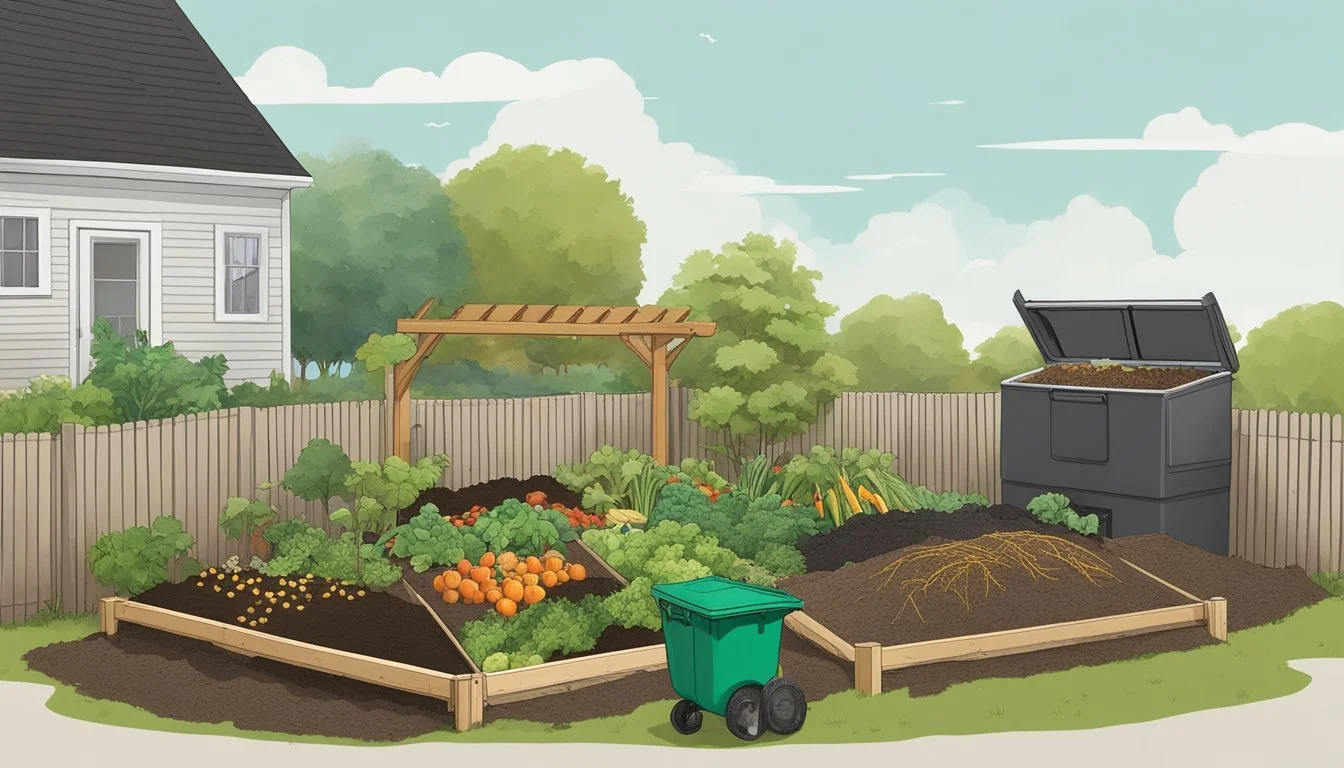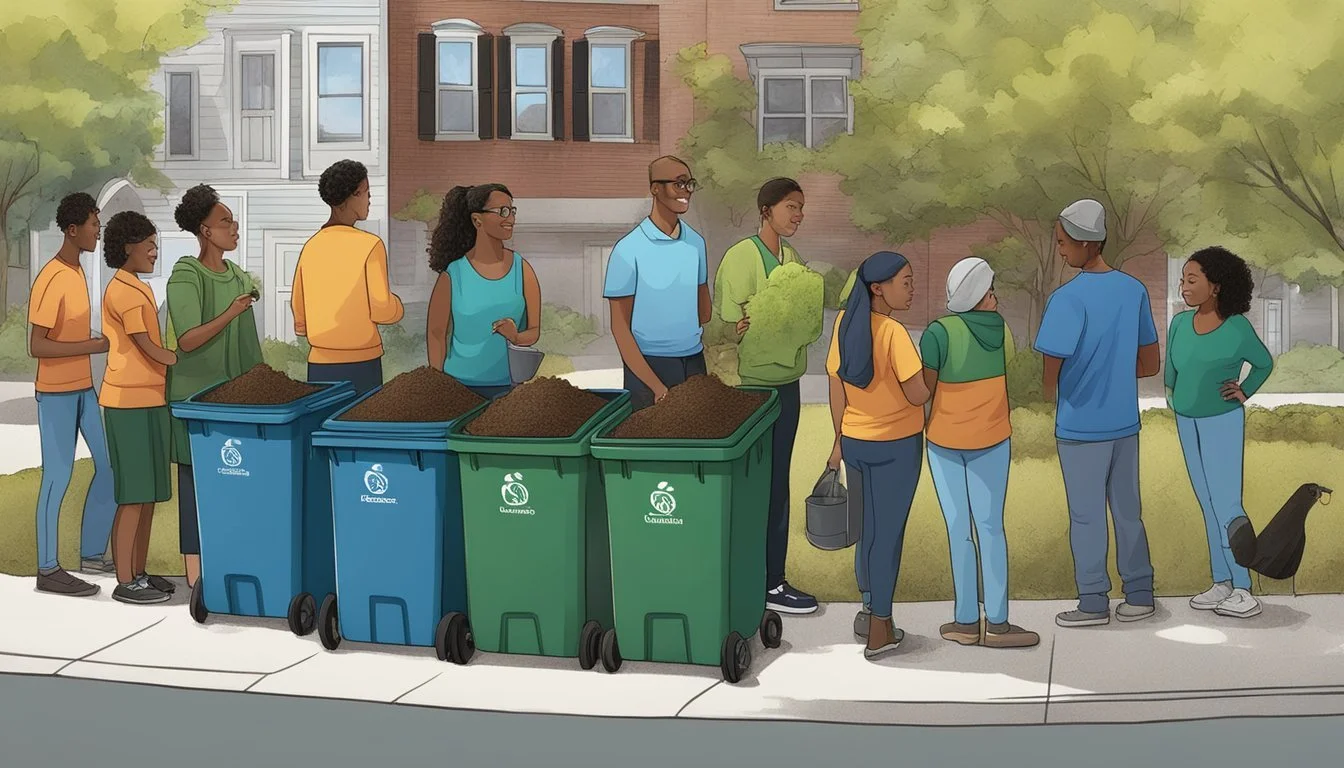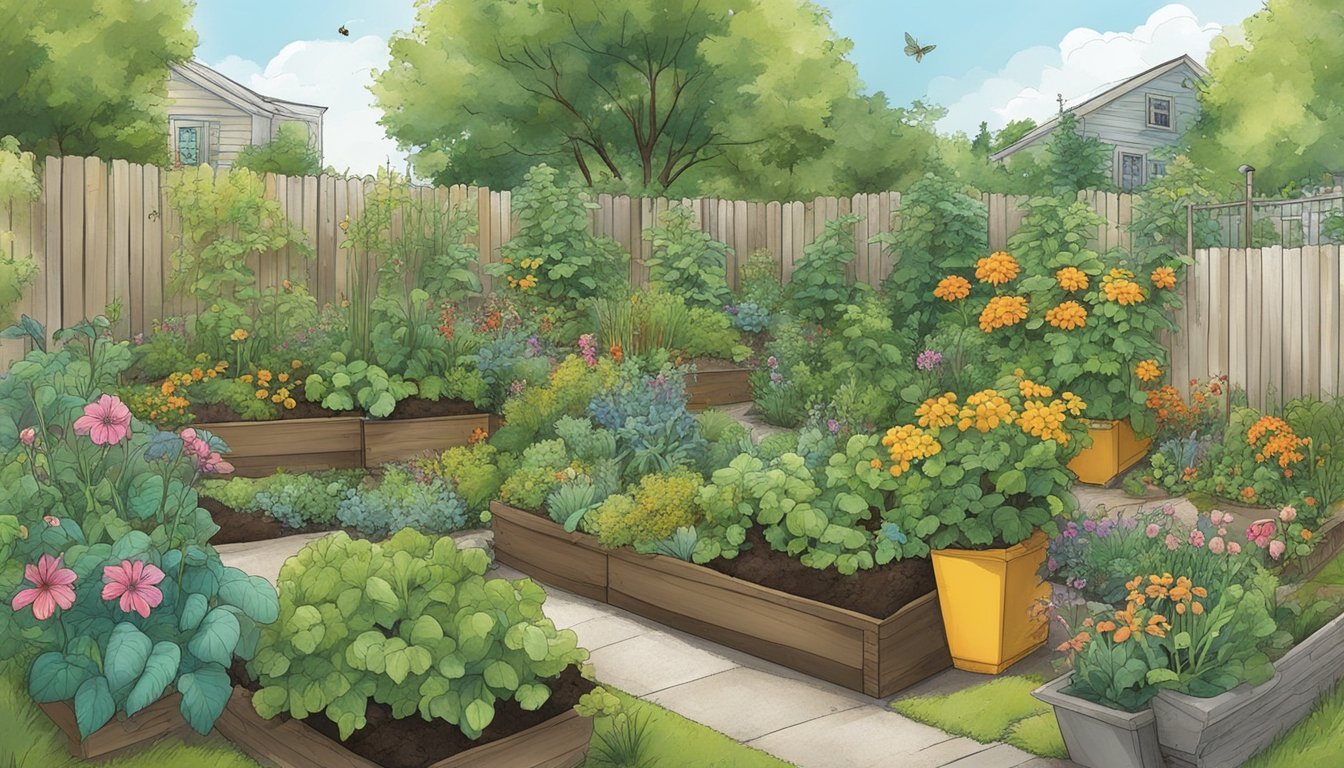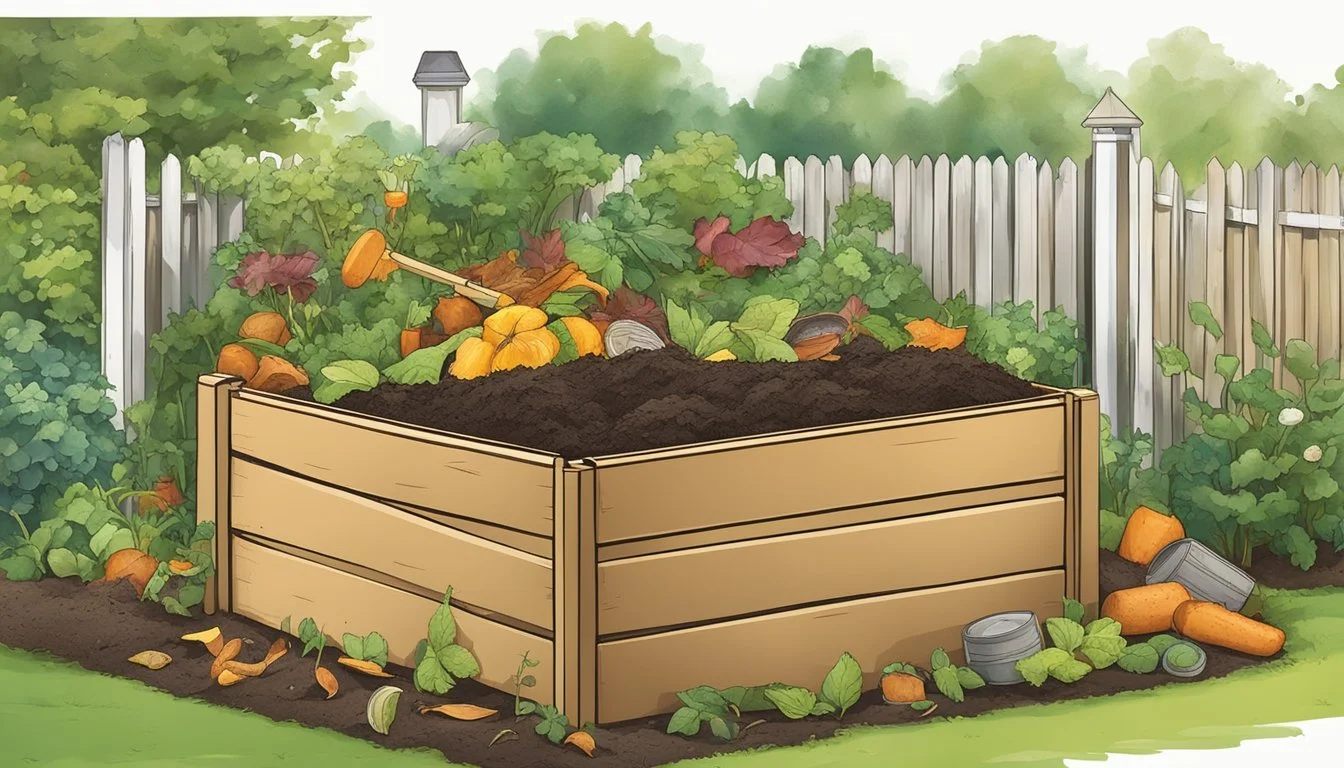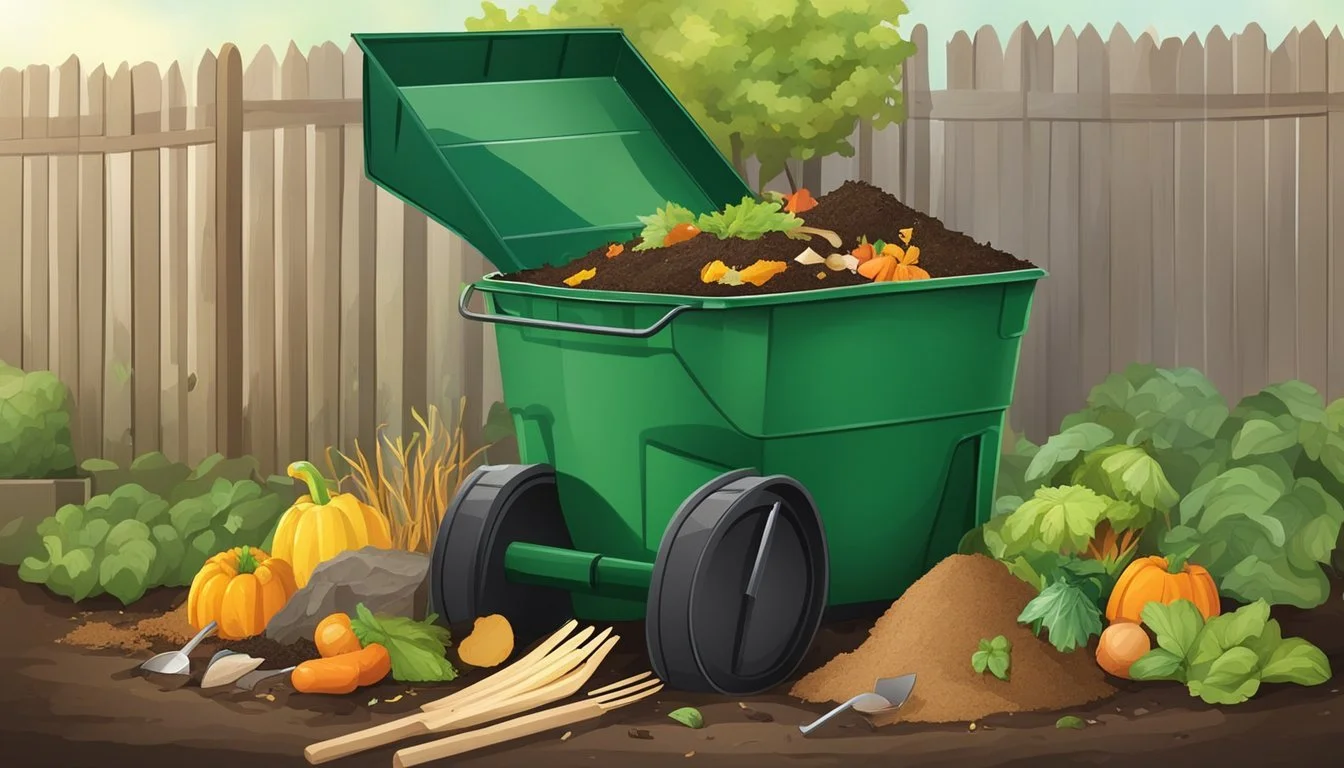Guide to Composting in Quincy, MA
Tips and Local Resources
Composting is an important practice for residents of Quincy, Massachusetts seeking to contribute to environmental sustainability. With an emphasis on waste reduction, this method of recycling organic material helps in cutting down the volume of garbage sent to landfills and plays a key role in nurturing healthier gardens and landscapes. In Quincy, yard waste such as grass clippings and leaves can be transformed into nutrient-rich soil amendments, which are then used to enrich city parks and public spaces.
The city of Quincy offers community programs and resources designed to educate and facilitate the composting process for its residents. Through municipal initiatives such as the Yard Waste Curbside Collection program, the city encourages participation by making composting accessible. This, coupled with local guides on backyard composting and workshops provided by environmental sustainability resources, empowers individuals to start composting at home.
The environmental benefits of composting are abundant, and when implemented effectively, they reach far beyond the borders of individual properties. Composting in Quincy not only reduces the amount of organic waste in the waste stream but also mitigates methane production from landfills, lowers the city's carbon footprint, and supports the local ecosystem's health through the use of organic fertilizers. As such, Quincy serves as a prime example of how municipal engagement in composting can yield significant environmental rewards.
Benefits of Composting
Composting offers numerous advantages for residents in Quincy, MA, especially in terms of environmental impact and soil quality. It is an effective method for reducing the amount of waste that ends up in landfills. Through the process of decomposition, organic waste is converted into a valuable soil addition, full of nutrients that can enhance plant growth.
Environmental Benefits: Composting significantly lowers the city's climate change footprint by diverting organic materials from methane-producing landfills. Since organic waste in landfills contributes to greenhouse gas emissions, composting is a proactive step towards combating climate change.
Soil Enhancement: The end result of composting is rich in nutrients, which improves soil health. It facilitates better water retention, fosters soil fertility, and stimulates healthy root development in plants. By adding compost to the soil, Quincy residents can maintain healthier gardens and landscapes.
Waste Reduction: Implementing curbside or drop-off composting options can lessen Quincy's reliance on landfill space. This helps to extend the lifespan of existing landfills and reduces the cost of trash tipping fees, estimated to save approximately $200,000 per year.
Composting at home is a convenient and inexpensive way to handle organic waste. The City of Quincy considers options such as curbside and drop-off composting programs to encourage this eco-friendly practice. These efforts are not only beneficial for the household but also for the broader community in terms of waste management and sustainability. Residents are encouraged to engage in composting practices to realize these collective benefits.
Composting Basics
Composting is the process of converting organic material such as food scraps and yard waste into a nutrient-rich soil amendment. In Quincy, MA, residents can engage in backyard composting or explore indoor composting options, including vermicomposting. Both processes promote sustainability and waste reduction.
When starting a compost pile, it's essential to balance green (nitrogen-rich) and brown (carbon-rich) materials. Food scraps typically provide nitrogen, while leaves and twigs supply carbon. The ideal ratio is approximately 1:3 of greens to browns.
Moisture and air are critical elements in the composting process. The material should be as moist as a wrung-out sponge. Turning the pile regularly introduces air, which accelerates decomposition and prevents odors.
Here's a simple guide to what can be composted:
Acceptable Greens Acceptable Browns Fruit and vegetable scraps Dry leaves and twigs Coffee grounds Cardboard egg cartons Tea bags Paper bags and newspapers
An appropriate bin is an integral part of backyard composting. These bins keep materials contained and can help regulate moisture and temperature levels. Options range from simple, open piles to more sophisticated, enclosed tumblers. Some residents may choose to keep a small compost heap within the boundaries of their property, adding food scraps and yard waste as they accumulate.
For those interested in vermicomposting, red wiggler worms can accelerate the composting process. This method is ideal for indoor composting because it's odorless and occupies minimal space.
Remember, certain materials like meat, bones, and dairy should be excluded from a compost pile, as they can attract pests and produce an unpleasant smell. Quincy residents can identify local composting facilities that process a broader range of materials by checking resources provided by the Massachusetts Department of Environmental Protection (MassDEP) and the Environmental Protection Agency (EPA).
Setting Up Your Composting System
Setting up a successful composting system in Quincy, MA, revolves around selecting an appropriate compost bin, placing it in the correct location, and maintaining the right balance of materials for optimal decomposition.
Choosing a Compost Bin
When selecting a compost bin for your Quincy residence, one must consider the space available and the amount of organic waste generated. Backyard composting enthusiasts can opt for an outdoor bin, which comes in various types like tumbler or stationary. For those with limited outdoor space, indoor composting systems like a worm bin or bokashi bucket are suitable choices.
Finding the Right Location
The right location for a compost bin balances accessibility with environmental factors. An outdoor bin should be placed on a level, well-drained spot that offers some shade to protect from excessive drying but gets enough sunlight to promote heat buildup. It should also be convenient for adding food scraps and yard waste like leaves and twigs.
Balancing Greens and Browns
A balanced compost pile requires a mix of 'greens' (nitrogen-rich materials like food scraps and lawn clippings) and 'browns' (carbon-rich materials like dried leaves, twigs, and paper). Aim for a ratio of about 3 parts browns to 1 part greens. The compost should remain as moist as a wrung-out sponge, and it requires air for organisms to thrive, so regular turning is recommended.
Composting Guidelines for Quincy Residents
In the city of Quincy, Massachusetts, residents can contribute to a greener environment by following specific composting guidelines, which help manage waste effectively and reduce the impact on landfills.
What to Compost
Quincy residents are encouraged to compost a variety of organic materials. Ideal compostable items include:
Fruit and vegetable scraps: Apple cores, banana peels, carrot tops, etc.
Yard waste: Grass clippings, leaves, and small branches.
Coffee grounds and filters.
Tea bags (without staples).
Paper products: Unwaxed paper plates, napkins, and paper towels.
Eggshells.
These materials break down easily and enrich the resulting compost, without attracting pests.
What Not to Compost
To maintain a healthy compost system, Quincy residents should avoid disposing of the following items in their compost bins:
Meat and bones: These can create odors and attract rodents.
Dairy products: Similar to meat, they can cause unpleasant smells and pest issues.
Oils and fats: These substances can interfere with the composting process and attract animals.
Diseased plant materials: To prevent the spread of plant diseases.
By following these guidelines, they ensure that the composting process is efficient, odor-free, and does not attract pests, while turning waste into a resource at their homes or the local dpw yard.
Maintaining Your Compost
Maintaining a compost pile in Quincy, MA, involves a balance of moisture, air, and the right materials. Proper maintenance not only expedites the composting process but also mitigates any unwanted odors and keeps the system healthy.
Moisture & Air:
A compost pile should be moist, similar to a wrung-out sponge, but not soaked. The presence of adequate water is crucial for the microbial activity that breaks down organic matter. If the pile is too dry, one can add water or wet materials to increase moisture levels. To ensure there is sufficient air circulation, turning the compost periodically is essential. This aerates the pile, distributing moisture and heat evenly, which helps to avoid odorous anaerobic conditions.
Materials:
Adding a variety of materials to the compost pile is critical for a well-balanced compost. Ingredients should include 'greens' for nitrogen and 'browns' for carbon. Using a compostable bag for kitchen scraps can simplify the transfer to the compost pile and keep the process clean.
Vermicomposting:
For those interested in vermicomposting, introducing red worms to an indoor compost bin can be an effective way to manage food waste. This method is particularly useful in Quincy’s urban settings where outdoor space may be limited.
Odor Control:
To control odor, it’s essential to avoid adding meat or dairy products to the compost, as these can decompose anaerobically and produce a foul smell. Should an odor arise, introducing more 'browns' such as dry leaves or straw can help to absorb excess moisture and reestablish the proper balance.
With consistent monitoring and adjustment, residents of Quincy can maintain a healthy compost system that contributes to the Environmental Sustainability Resources of the community.
Using Finished Compost
Finished compost is a powerful addition to both gardens and potted plants, acting as a nutrient-dense supplement to support plant growth. Gardeners can apply finished compost to garden beds by mixing it into the top few inches of soil, providing plants with essential nutrients they need for healthy development.
For lawn care, finished compost can serve as an effective top dressing. Sprinkling a thin layer over the grass can enhance soil quality and promote a lush, vibrant lawn.
In the context of potted plants, compost can be utilized to refresh potting soil or as a component in homemade potting mixes. To ensure proper drainage and aeration, one might mix equal parts of compost, vermiculite, and topsoil.
Application Method Benefit Garden Beds Mix into the topsoil Enhances soil fertility and structure Lawn Use as a top dressing Improves soil quality and promotes healthier grass Potted Plants Mix into potting soil Provides nutrients, improves drainage, and supports growth Mulching Spread around the base of plants Retains moisture, regulates soil temperature, reduces weeds
Mulch made from finished compost can also be spread around the base of plants. This layer helps retain soil moisture, regulates temperature, and suppresses weed growth, all of which are beneficial during the growing season.
It's important for gardeners in Quincy to remember that using compost not only enriches their soil but also contributes to sustainability efforts by recycling organic materials. Residents seeking to add composting services can refer to options such as the curbside collection service provided by Black Earth Compost. Using finished compost is an environmentally friendly method to elevate garden and lawn care practices.
Community and Curbside Programs
Residents of Quincy, MA have access to a variety of composting services designed to reduce waste and support environmental sustainability. These include local curbside pickup services, as well as community-driven drop-off sites for easy access to composting options.
Local Curbside Pickup Services
Quincy offers a Yard Waste Curbside Collection program which allows residents to have their yard waste picked up right from their doorstep. This service operates on a specific schedule and is managed by the city's Department of Public Works (DPW). Residents should place their yard waste on the curb by 7 A.M. on collection days to ensure pickup.
Additionally, Black Earth Compost runs a curbside collection service for a wider range of organic materials, including meat, bones, and dairy. Bins should be placed on the curb by 6 A.M., lined with a compostable bag to contain the food scraps. Participants in this program receive finished compost in return, closing the loop on organic waste.
Drop-off Sites and Community Composting
For residents without access to curbside pickup or those living in apartment buildings, Quincy offers convenient drop-off sites for compostable waste. The city's community composting program encourages residents to contribute to a greener Quincy by providing designated areas where they can drop off their compostable items.
The MassDEP works to increase organic material diversion from disposal and has a list of resources for residents, including local composting facilities and guidance for starting one's own composting project. This supports community composting efforts and provides alternatives for those without a yard or curbside service.
Composting for Businesses
Businesses in Quincy, MA have the opportunity to be at the forefront of environmental sustainability by engaging in commercial composting practices. This initiative is not just beneficial for the environment, but it can also aid in waste management and reduce operational costs.
Materials Accepted in Commercial Composting:
Food scraps (e.g., fruits, vegetables, meat, poultry, seafood, bread, pasta)
Food-soiled paper (e.g., napkins, towels, uncoated paper plates)
Plant trimmings (e.g., floral arrangements)
Office buildings can begin composting by setting up designated collection bins for organic waste. Once collected, materials can be turned over to local facilities, such as Black Earth Compost, which specialize in curbside food scrap collection and transforming this waste into nutrient-rich soil.
For larger institutions like corporate campuses, they may opt to partner with local farms or specialized commercial composting services that can handle bulk quantities of organic waste. Not only does this support local agriculture, but it also creates a closed-loop system that gives back to the community.
The Department of Public Works in Quincy provides resources for composting at the city's compost heap. Businesses can contribute yard waste, which is subsequently processed and made useful for various applications.
Key Considerations for Business Composting:
Educate and encourage employees on proper sorting practices.
Regularly schedule food scrap collection to maintain hygiene and efficiency.
Cooperate with certified composting firms to ensure compliance with local regulations.
Businesses in Quincy can lead change in sustainable practices, showcasing their commitment to the environment and their community. By integrating composting into their waste management strategies, they contribute to a greener future.
Education and Outreach
In Quincy, MA, effective composting education and outreach initiatives are vital for promoting sustainability within the community. These programs are designed to ensure that residents have access to the necessary information on how to implement composting practices effectively.
Workshops and Seminars
The Department of Public Works in Quincy facilitates a range of workshops aimed at teaching residents about the benefits and methods of composting. Attending these seminars, individuals can learn hands-on composting techniques and gain insights into the practical aspects of reducing food waste. For convenience, workshop schedules and topics are often disseminated via email to interested parties.
Educational Materials
A variety of educational materials are available to supplement the learning from workshops. Infographics and posters in English and Spanish cover the basics of composting, providing clear visual cues that simplify the process. These materials are widely distributed by the city's environmental programs and are also accessible through the program's email lists. Residents can easily request these materials, which include detailed guidelines on what can be composted and how to troubleshoot common composting issues.
Troubleshooting Common Issues
When managing a compost bin in Quincy, MA, individuals may encounter a variety of challenges. Understanding how to address these common issues is crucial for maintaining a healthy composting system.
Odor: A well-balanced compost should not emit a strong smell. If a compost pile starts to smell, it often indicates an imbalance in the carbon-to-nitrogen ratio or poor aeration. To correct this, homeowners should ensure they maintain an ideal C/N ratio of 25-30:1 and turn the pile to improve airflow.
Moisture: Compost piles need the right level of moisture to decompose materials effectively. If the compost is too dry, decomposition slows down. Conversely, too much moisture can lead to odor problems and anaerobic conditions. A compost pile should feel like a wrung-out sponge. To fix moisture issues, add dry materials like leaves or adjust watering practices accordingly.
Rodents: To prevent rodents, one must be cautious with what materials they add to their compost bin. Avoid placing meat, dairy, and cooked food into the compost. These items can attract rodents and other pests. Using a bin with a tight-fitting lid and lining the bottom with wire mesh can also deter these unwanted visitors.
Contamination: Non-compostable materials can contaminate a compost pile, disrupt the composting process, and render the finished compost unusable. Consumers should only add appropriate compostables like fruit and vegetable scraps, yard waste, and uncoated paper.
Individuals should remember that troubleshooting compost issues involves observation, patience, and a bit of trial and error. Following these guidelines can help ensure a productive composting experience in Quincy, MA.
Special Topics
Exploring advanced composting methods and practices, this section provides insights into specialized composting techniques that cater to unique living situations and sustainable garden care in Quincy, MA.
Worm Composting (Vermicomposting)
Vermicomposting utilizes worms to break down organic waste into nutrient-rich compost. In Quincy, residents can manage organic waste through vermicomposting, which is especially suitable for those living in apartments or without larger garden spaces. Worms, like red wigglers, play a crucial role by consuming and processing food scraps and paper into compost.
Composting in Small Spaces
Indoor composting is a viable option for those with limited outdoor space. By using specialized containers and following recommended practices, apartment dwellers in Quincy can still recycle their food scraps efficiently. Small-space composting methods require careful attention to factors like aeration, moisture, and temperature to ensure a successful composting process.
Grasscycling and Leaf Mulching
Grasscycling involves leaving grass clippings on the lawn after mowing, providing a natural fertilizer that contributes to a sustainable lawn. Leaf mulching, on the other hand, repurposes fallen leaves into a protective layer for soil, retaining moisture and suppressing weeds. These garden practices in Quincy reduce waste and conserve energy, supporting the city’s environmental goals outlined on the Quincy's Compost Heap page.
Frequently Asked Questions
What options are available for composting in Quincy, MA? Residents of Quincy have multiple avenues for composting. They can engage in backyard composting, use worm bin composting, or utilize the city's organized composting services.
Where can I find a compost bin in Quincy? Compost bins may be available through municipal programs or can be purchased from local or online retailers. For specific locations and tips, the Massachusetts government website can be consulted.
Is there a curbside pickup service for compost in Quincy? Yes, Quincy provides a curbside pickup service for compost materials. Black Earth Compost offers detailed guidelines on preparing your compost bin for curbside collection.
What can I put in my compost bin? Your compost bin can include a variety of food scraps, yard waste, and organic material. Accepted items commonly include fruits, vegetables, coffee grounds, eggshells, and grass clippings. Meat, bones, and dairy require a specialized composting service like Black Earth Compost.
How does recycling differ from composting in Quincy? Recycling in Quincy focuses on the reprocessing of materials such as plastics, glass, and paper products, while composting is the process of decomposing organic material into nutrient-rich soil. The city provides resources and locations for both practices through the Beyond the Bin directory for recycling and local compost programs for organic waste.
Additional Resources and Contacts
Residents of Quincy, Massachusetts looking for composting information and resources can reach out to multiple entities. These contacts and resources provide guidance and support for composting practices.
City of Quincy Department of Public Works (DPW) Yard:
For information about curbside collection schedules and local composting initiatives.
Address: Quincy, MA 02169
Phone: (617) 376-1000
Hours: Monday through Friday, 8:30 AM to 4:30 PM
Email: Use the contact form on their Environmental Sustainability Resources page.
Massachusetts Department of Environmental Protection (MassDEP):
Provides guidance on home composting and resources such as low-cost compost bins.
Website: Check the Ask Your Municipality page for compost bin distribution programs.
Environmental Protection Agency (EPA):
Offers comprehensive information on composting basics.
Resources: Details are available on the EPA's Composting at Home page.
Quincy's Compost Heap:
It's an example of a local composting effort, promoting the use of yard waste for compost rather than sending it to landfills.
Website: View Quincy's composting model on their Open Green Map.
For more in-depth guidance and additional educational materials, residents may contact these entities directly through the provided contact details or through their official websites. The resources offer valuable support for those looking to start or improve their composting efforts.



